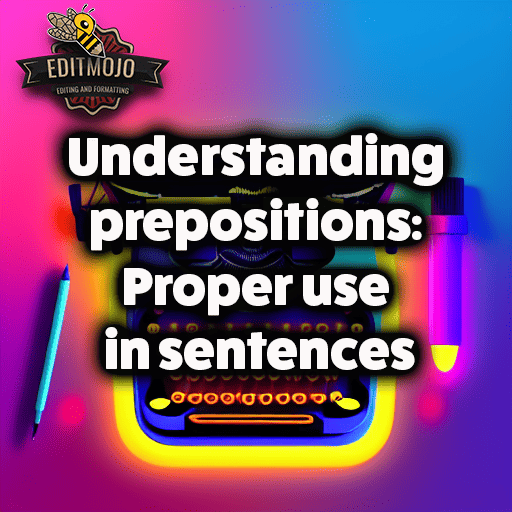Category: Writing Resources
-
Pronoun-antecedent agreement | Explained and illustrated
Pronoun-antecedent agreement | Explained and illustrated Pronoun-antecedent agreement | Explained and illustrated. Pronouns and antecedents – two of the numerous building blocks of English grammar that we often use without giving much thought. These fundamentals lay the foundation for clear and effective communication. They hold the power to either clarify your message or turn it…
-
Understanding Prepositions: Proper Use in Sentences
Understanding prepositions: Proper use in sentences Understanding prepositions: Proper use in sentences. Ever wondered why a small word like in, at, on, over, or with can sometimes make or break your sentences? Welcome to the world of prepositions – the tiny heroes of the English language that bind words together, providing coherence and structure to…
-
Understanding modals: Correct usage of could, would, should, etc.
Understanding Modals: Correct Usage of Could, Would, Should, and More Understanding modals: Correct usage of could, would, should, etc. Navigating the English language can sometimes feel like trying to solve an intricate puzzle. However, learning to use modals correctly can be a significant piece in completing that puzzle. English is replete with fascinating elements that…
-
Active vs. passive voice: Understanding the difference
Active vs. Passive Voice: Understanding the Difference Active vs. passive voice: Understanding the difference. The rules of English grammar are as vast as the ocean. Among those countless rules, the distinction between active and passive voice is perhaps one of the most vital. So, let’s embark on this journey of exploration. As linguist and cognitive…
-
Subject-verb agreement in English grammar: Explained
Subject-verb agreement in English grammar: Explained Subject-verb agreement in English grammar: Explained. English grammar might seem like a labyrinth at first, but every rule, every exception is a stepping stone towards proficiency. Subject-verb agreement, one such rule, is the backbone of articulate English communication. As novelist Muriel Barbery beautifully stated, “Grammar is a piano I…
-
Understanding English Tenses: A Comprehensive Guide
Understanding English tenses: A comprehensive guide Understanding English tenses: A comprehensive guide. Understanding English tenses is crucial for effective communication. This guide will provide a comprehensive overview of English verb tenses, from the basics to the more complex aspects. The Basics of English Verb Tenses (grammar) English tenses can be broadly categorized into three types:…
-
Unravel Time: Top Historical Fiction Books of All Time to Transport You Back
Top Historical Fiction Books of All Time. Dive into our expertly curated list of the top historical fiction books of all time. Transport yourself to eras gone by, one page at a time! Reading historical fiction is akin to owning a magical time machine. With every turn of a page, you’re transported back to a…
-
Master the Art of Using Parentheses and Brackets: Unveiling Secrets & Stellar Examples
Using parentheses and brackets: Proper usage and examples Using parentheses and brackets: Proper usage and examples. Demystify the mystery of using parentheses and brackets with our comprehensive guide. Discover proper usage and compelling examples to bolster your writing style. Understanding the art of punctuation can be as exhilarating as mastering the notes of a musical…
-
Farther vs. Further: Unraveling the Distance Dilemma in English
Farther vs. further: Which is correct for distance? Farther vs. further: Which is correct for distance? Language is a delicate dance of words, where even the tiniest misstep can lead to a faux pas. English, with its rich lexicon and intricate rules, is no exception. A perennial source of confusion for many is the question:…
-
Complement vs. Compliment: Unravel the Mystery of These Look-alike Words
Complement vs. compliment: Understanding the distinction. In the realm of the English language, few things are more perplexing than homophones. These are words that sound alike but have completely different meanings. An iconic pair of homophones that often trip people up is ‘Complement’ vs. ‘Compliment’. Their similar spellings and pronunciation are a linguistic trap, causing…









